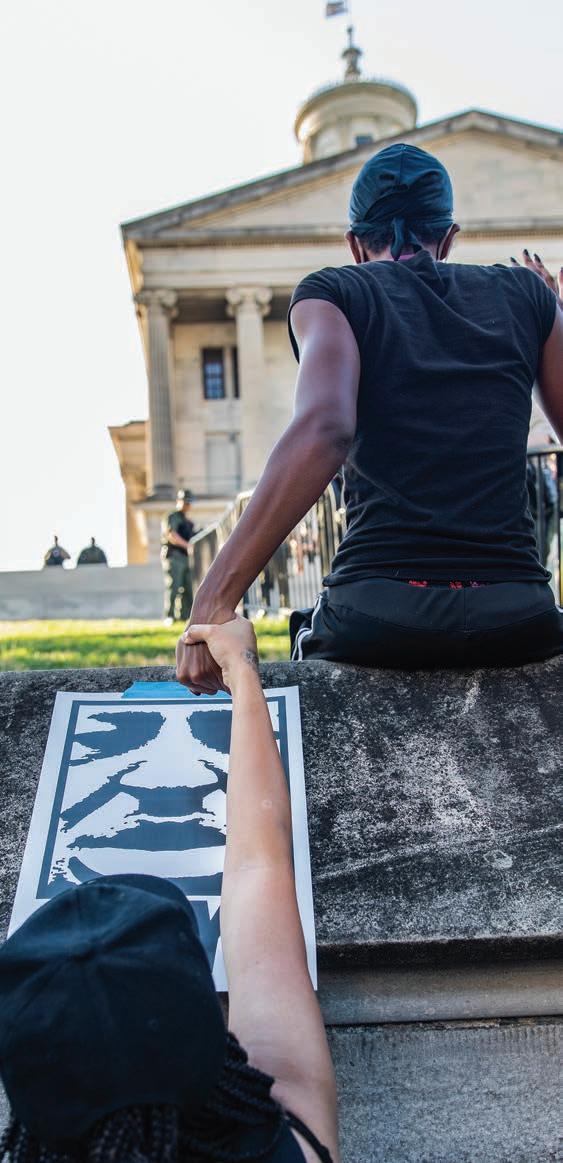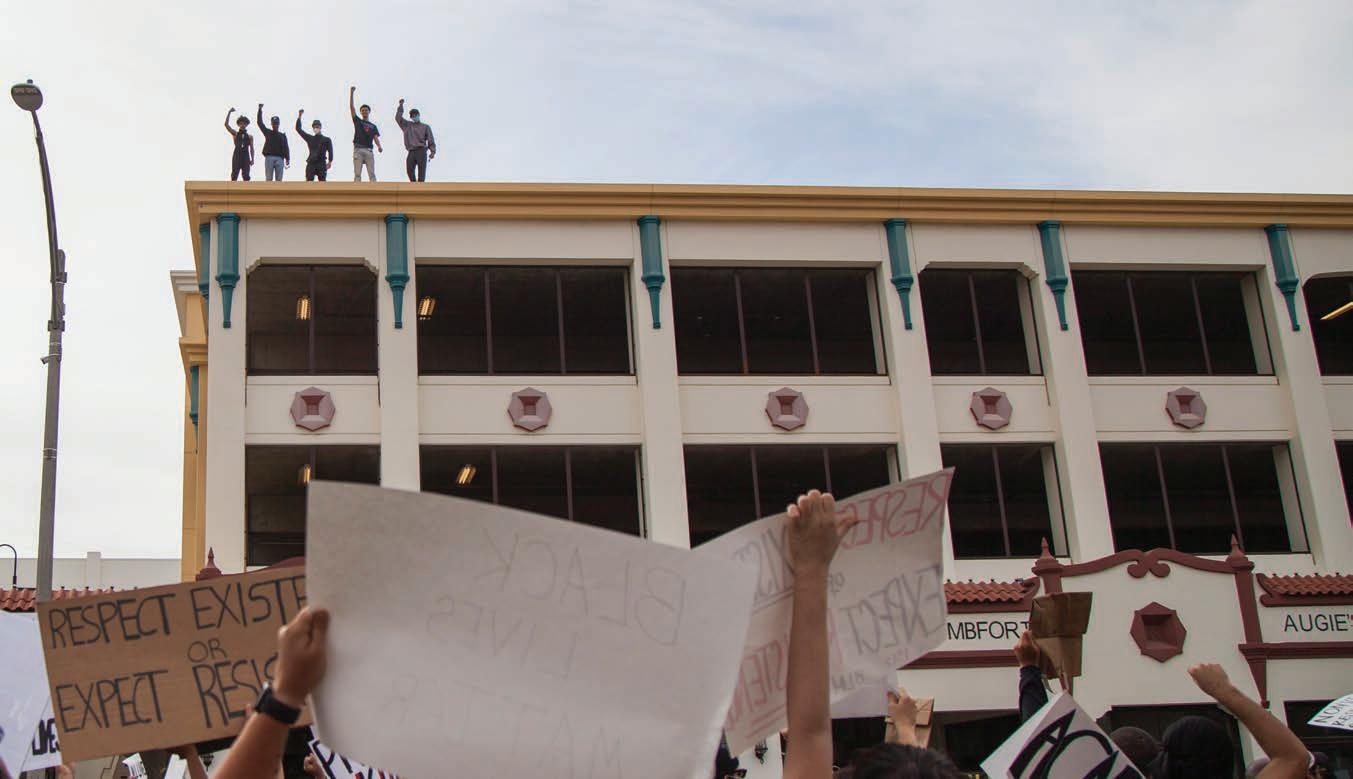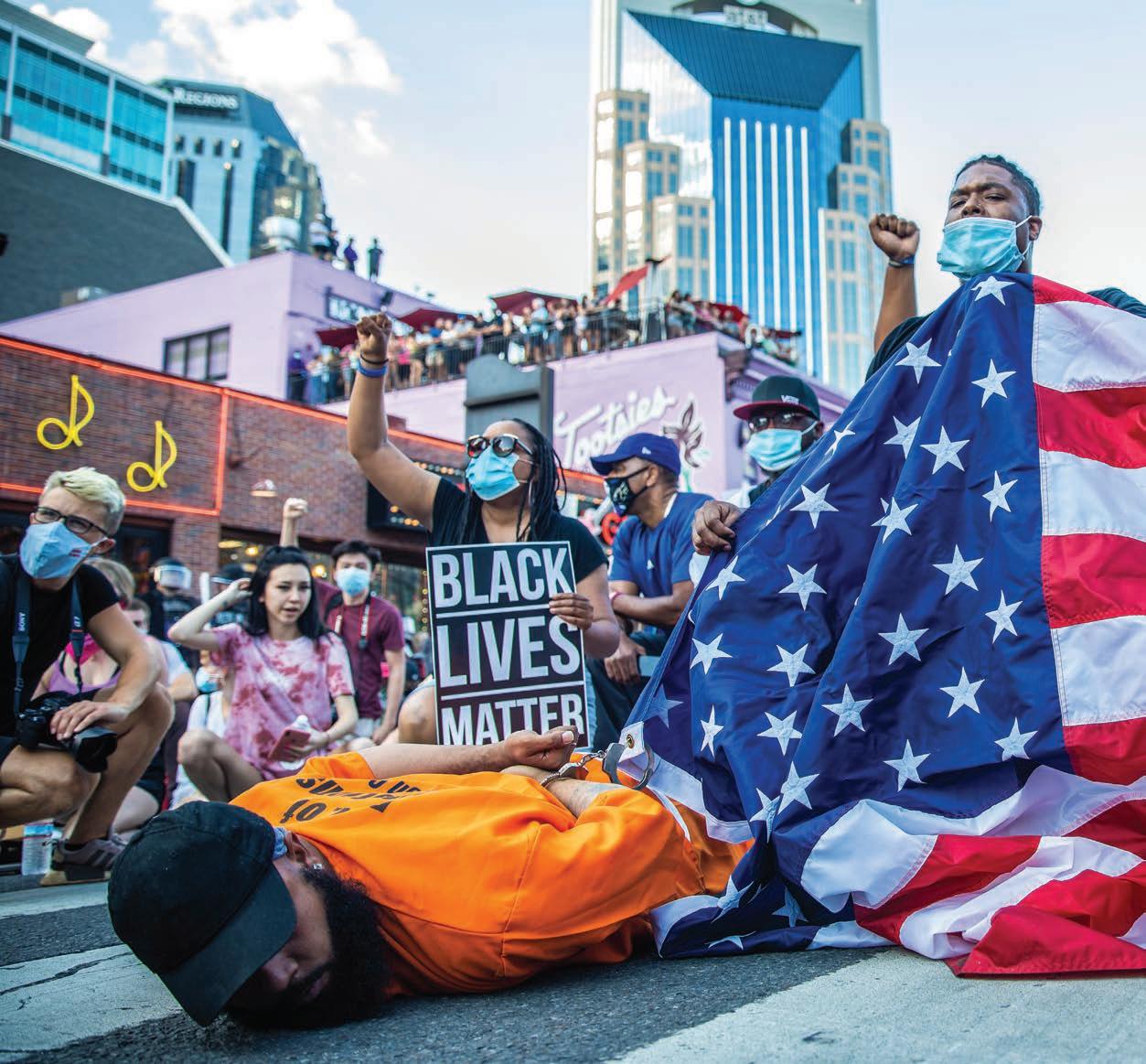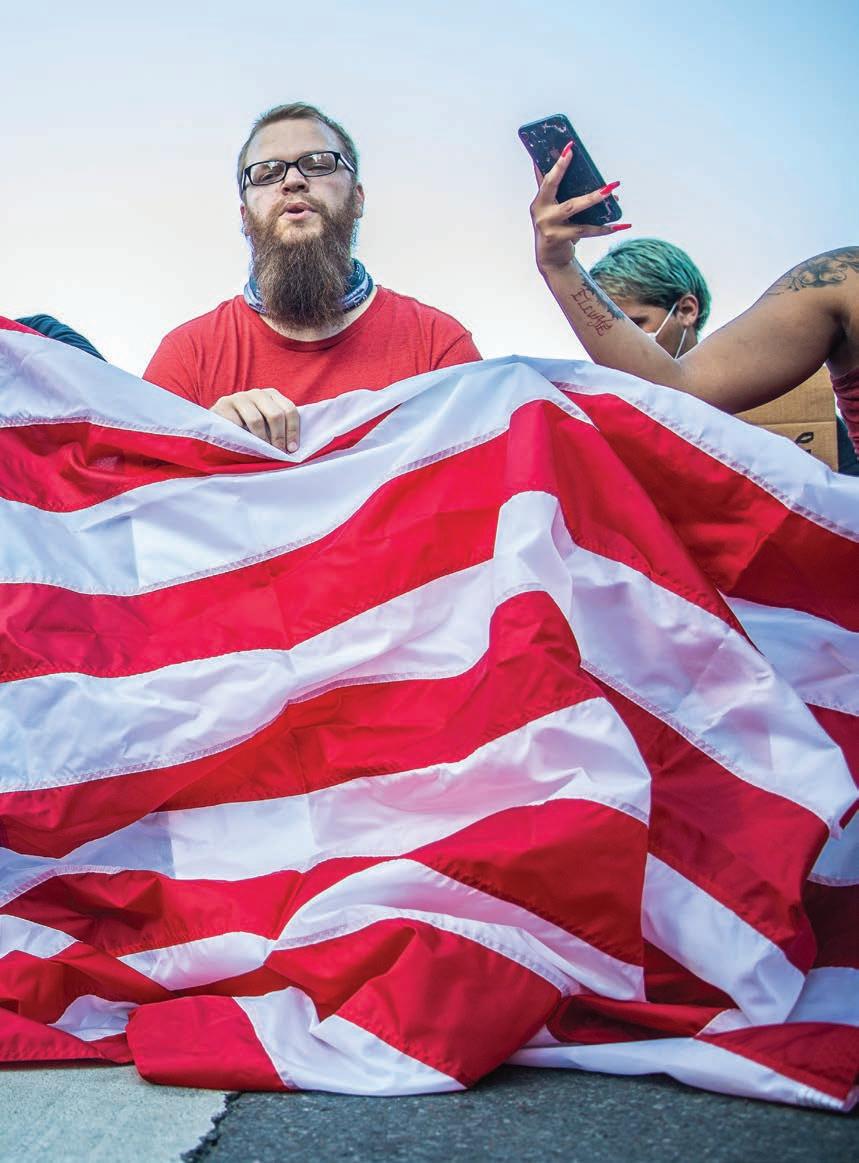
8 minute read
A Call for Justice
Expanding the Boundaries of Social Activism, Outreach and Ministry
Written by Teddy Peña Photos by Phillip Ndowu, Austin Romito and Luc Stringer
Advertisement
The landscape of this year, drastically altered by the COVID-19 pandemic, has left an imprint of uncertainty on the future. Nationwide, job security is shaky, schools remain closed, national sporting events air to empty stadiums and music festivals have halted. The pandemic has affected all interpersonal interaction, nationally and globally, whether through health, employment, education, social issues or humanitarian outreach.
California Baptist University’s International Service Projects, for example, faced cancellation for the second year in a row. John King, director of Mobilization, said many students showed dedication to continue serving virtually this year despite the difficult decision to suspend ISP for another year.
“We knew that students were really looking forward to going on their ISP trips this year. It was not an easy decision to suspend travel again for this year. It really ended up coming down to the timeline that we had to make the decision on,” King says. “However, some students had an amazing opportunity to engage in a virtual service project. A couple of people from an ISP location had reached out to us in hopes to continue a service project that could take place over video chat. These international students wanted to improve their English and were even given the opportunity to hear the gospel message. For an hour each week, the students connect with each other and talk about life and whatever it is that is on their minds.”

Protesters come together during the summer to support each other in front of the Tennessee State Capitol.
Julie Dobbins, director of Women’s Ministries at CBU, said students have still been searching for ways to serve in the community that conform to pandemic safety guidelines.
“Students were still seeking ways to be in community and serve through Spiritual Life at CBU. We were looking for programs that were still following safety protocols so that we could give students opportunities to serve while still being careful about COVID-19,” Dobbins says. “Even though we were unable to host events due to the pandemic, we connected students with organizations such as Feeding America and Keep Riverside Clean and Beautiful, where they were able to serve their community in a safe and effective way.”
Feeding America is a food pantry that seeks to alleviate hunger nationwide. Its local banks have remained open, following guidelines set by the Centers for Disease Control and Prevention while offering limited services to the Inland Empire community. Keep Riverside Clean and Beautiful, another nonprofit organization, partners with institutions to participate in beautification projects in the city of Riverside such as tree-planting, litter prevention and graffiti eradication.

Protesters unite in pursuit of justice and equality over the summer in downtown Riverside.
The unprecedented global pandemic that created these limitations on outreach has also overlapped with widespread calls for social reform, creating a moment that looks unlike any other in American history, both figuratively and literally. In the wake of the death of George Floyd, advocacy for social justice sparked a nationwide call to activism that took shape through protests, education and conversation among people from every background.
“I was at the protest in downtown Riverside in early June,” says Haley DeLacy, junior psychology major. “There were a lot of people there. There were signs, masks and social distancing. There were even tables set up with water and snacks. The organizers had Black men and women speak before we marched. Being able to support these men and women, letting their voices be heard, marching with them, chanting with them, kneeling with them — it made me feel a part of something so much greater than myself. It was really humbling.”
These demonstrations swiftly garnered national news, with the goal of igniting tangible, practical social change in a country experiencing the repercussions of injustice. Many popular social movements received coverage from the press, with coronavirus concerns bringing these rallies both positive and negative attention.
Rising concern over the risk of spreading COVID-19 prevented on-the-street protesting for many who support the cause. However, the prevalence of social media and other online platforms allowed people to creatively advocate for social justice through avenues that did not exist in the not-so-distant past.
Jenesis Andrews-Kendale, junior applied theology major, created and published her own devotional, rooted in the topic of biblical justice, on Instagram earlier this summer. The 14-day devotional, titled “Love Justice: I Dare You,” was released amid intense civil unrest in response to the treatment of Black people in America.

Protesters of from a variety of backgrounds gather to call for justice in Nashville this summer after the death of George Floyd.
“I really spent the most time just deciding whether I should write it or not. It started out as a regular Bible study when I figured out that it was something that I truly wanted to do. I then grew to realize that there is a lot that the Bible has to say about justice. It was personally so encouraging,” Andrews-Kendale says. “Then I thought to myself, ‘I should put this all together somehow so more people can learn about biblical justice.’ I took the opportunity to read the Scriptures and meditate on them and do my best to be obedient to what the Lord was telling me to do when I was writing the parts of the devotional that were my own commentary.”
Damon Horton, assistant professor and director of CBU’s Intercultural Studies program, explained that the idea of authentic biblical justice is one rooted in equity.
“Biblical justice is God’s people literally seeking to imitate God’s character to the best of their ability. Human beings are fallen. We’re broken. We’re sinful. But, God is absolutely perfect and righteous,” Horton says. “God expresses equity, justice and fairness all throughout his word. And so followers of his should do the best we can to apply those principles in the complex nuances of our society. Biblical justice is God’s character and nature.”
After the initial response to this summer’s racial justice movement came the wave of conversation exchanging experiences and ideas and raising educational and social awareness. Then, many people faced the dilemma of what do to next. Across mainstream and social media, activists have stressed the importance of building one another up, learning from one another and showing grace in this rapidly evolving digital era of social justice.
While media platforms introduced many to the need for social justice and continued to allow for important conversation amid rising activism, they also present the risk of engagement burnout.
“One thing that really contributes to burnout — not just Black Lives Matter activism, but with activism involving modern-day slavery and sexual assault — is the influence of media.
Media approaches you at all sides constantly,” DeLacey says. “There’s the propensity for some of the information to be extremely biased or inaccurate. I try not to take everything I see in the media as a hard fact. Compassion fatigue is something to watch out for as well. Once that sets in, it’s hard to express empathy and compassion for the things we have a fire in our hearts for.”
Dr. Charles Lee-Johnson, director of CBU’s Master of Social Work program, offered a spiritual approach to combating burnout during eras of civil unrest.

“The Black Lives Matter Movement is one of the first-ever movements in the history of Black civil rights that is disconnected from the church. It’s one of the few movements that have no spiritual foundation. I believe that many individuals are currently experiencing burnout because when there is no spiritual connection, then there is no place to get refueled,” Lee-Johnson says. “It’s anger. It’s disappointment. It's frustration. In the Bible, Jesus explains to the woman at the well that he is the water of life that never runs out. And that is what people need to continually reignite their passion for justice and equality.”
Lee-Johnson also offered advice for maintaining passion for social justice while also putting action to words. A concept practiced with students in the Master of Social Work program, Lee-Johnson said, is the idea of healing circles as part of the restorative justice process.
“One of the things that the program encourages people to do is create healing circles. This is a part of a process that is known as restorative justice. This concept grew out of places where people had experienced severe trauma and you put them in mixed groups in order for these individuals to talk about their experiences,” Lee-Johnson says. “We’ve been encouraging folks to engage in these healing circles. Find folks that don’t look like you or have different experiences than you, usually 10–12 people, and talk about issues and what’s going on today. There is an aspect of individuality when it comes to activism. Every individual with a passion for social change has their own personal journey explaining how they were introduced to their admiration for justice.”
Students like Andrews-Kendale strive to live out this concept in word and deed, making the daily effort to understand differing perspectives.
“I didn’t want to be somebody that I wasn’t, because I do not want to come off as not genuine,” Andrews-Kendale says. “I started listening to a lot of people like Latasha Morrison, Jemar Tisby and Albert Tate, who is my pastor at Fellowship Monrovia. Then I made an effort to talk to the community around me and learn about the experiences of my peers.”
This intentional commitment to learning the experiences of those unlike us has been a pillar of hope in a time of uncertainty. While we have been stretched physically, mentally and emotionally, we have also learned together, marched hand-in-hand together, and continue to advocate for social justice and equality together. This year more than any other has required from each of us a renewed courage, grace and resiliency — a resiliency that fights for the spirit of humanity. Our collective yearning for justice has planted a new hope and reality for a better tomorrow for ourselves and our neighbors — a tomorrow of unity and of peace. ◆

